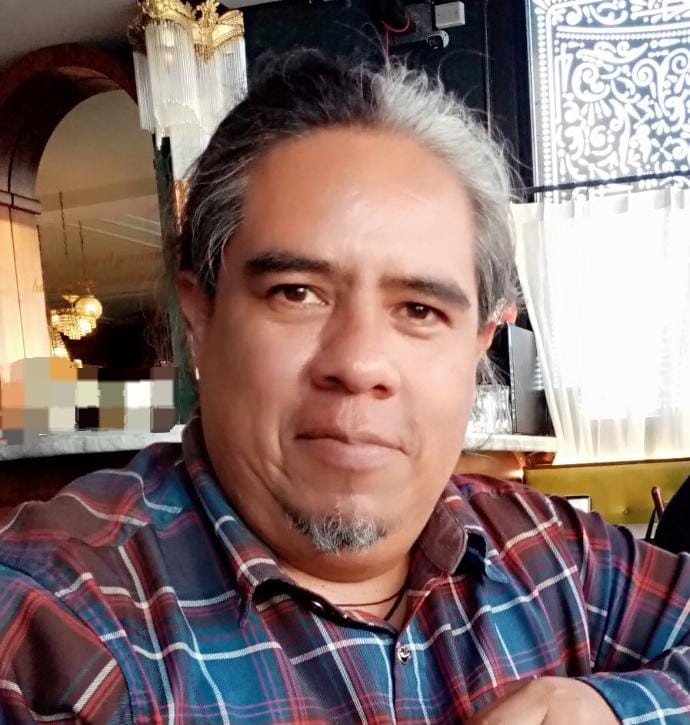Indigenous Learning Forum: "Patrimonio documental comunitario en náhuatl de Tlaxcala, México" with Raul Macuil Martínez

The second 2024-2025 Indigenous Learning Forum will take place November 7, 2024 at 3:00 p.m. ET on Zoom. This talk will be given in Spanish with English translation.
This event is open to all but registration is required.
Dr. Raul Macuil Martínez es licenciado en Historia por la Facultad de Filosofía y Letras de la Universidad Autónoma de Tlaxcala. Doctor en Patrimonio de los Pueblos Originarios, por la Universidad de Leiden, en los Países Bajos. Es hablante del idioma náhuatl de la variante dialectal de Tlaxcala. Pertenece al Sistema Nacional de Investigadoras e Investigadores Nivel 1 del Consejo Nacional de Ciencias, Humanidades y Tecnologías (CONAHCYT). Es docente en la Universidad Pedagógica Nacional. Unidad 131-Hidalgo. Tiene cuatro libros publicados como autor único y tres más en coautoría con diversos especialistas en Historia, Antropología y Educación.
Dr. Raul Macuil Martínez has a bachelor’s degree in History from the Faculty of Philosophy and Letters of the Autonomous University of Tlaxcala, and a Doctorate in Heritage of Native Peoples from the University of Leiden, in the Netherlands. He is a speaker of the Tlaxcala dialect of the Nahuatl language. He belongs to the National System of Researchers Level 1 of the National Council of Sciences, Humanities and Technologies (CONAHCYT). He is a teacher at the National Pedagogical University, Unit 131-Hidalgo. He has four books published as sole author and three more co-authored with various specialists in History, Anthropology and Education.
Español
En el presente trabajo es el resultado de las investigaciones que se han realizado en los archivos comunitarios de Tlaxcala, estos son resguardados por los fiscales, quienes son hasta ahora una de las figuras de autoridad locales.
Los archivos comunitarios, o los archivos de los fiscales como también se les conoce, resguardan parte de la memoria documental de la localidad, escritos en la lengua que la misma población hablaba, el náhuatl o el mexicano.
Los archivos de las fiscalías tlaxcaltecas ofrecen información que nos permite comprender las relaciones, conflictos y negociaciones que realizaban las comunidades entre ellas mismas y ante el orden castellano, además de la organización interna para llevar a cabo obras colectivas, como la construcción de la iglesia, además del registro detallado que se elaboraba de los ingresos, y los gastos que se realizaban en la compra, venta, renta de tierras, pulque, maíz, para las fiestas de las comunidades, o el recibimiento de alguna figura política o religiosa a la comunidad, además se realizaba también el registro detallado de las diligencias que se hacían en la ciudad de Puebla o México, a este tipo documenta se le ha denominado como memoria de los fiscales.
En los archivos de las fiscalías se han localizado obras de teatro, documentos religiosos, testamentos, genealogías, anales. Esto nos demuestra que las comunidades se preocuparon por que quedara constancia de su trabajo y labor en sus localidades.
Hoy en día, por desgracia una gran cantidad de las comunidades tlaxcaltecas han pedido la habilidad de leer sus propios documentos en la lengua de sus ancestros, las comunidades saben que hay documentos antiguos, que son importantes, y que hay que cuidarlos, pero ya no se tiene acceso a la información que contienen los documentos.
El gobierno del estado de Tlaxcala, el Archivo General de la Nación, la Universidad Pedagógica Nacional Unidad 131-Hidalgo, han elaborado un taller al cual se le ha denominado Taller de paleografía de documentos nahuas siglo XVI-XVIII, con el propósito de que las comunidades tlaxcaltecas reaprendan a leer y traducir sus propios documentos, y así fomentar la investigación desde las propias comunidades.
English
This work is the result of research that has been carried out in the community archives of Tlaxcala, which are protected by prosecutors, who up to the present are among the local authority figures.
The community archives, or the prosecutor's archives as they are also known, safeguard part of the documentary memory of the town, and are written in the language that the same population spoke, Nahuatl (or Mexicano).
The archives of the Tlaxcalan prosecutor's offices offer information that allows us to understand the relationships, conflicts and negotiations that the communities engaged in among themselves and with the Castilian order. It also documents internal processes for carrying out collective works, such as the construction of the church, as well as detailed records of the income and the expenses involved in the buying, selling, and rent of land; and the purchase of pulque and corn for community festivals or the reception of political or religious figures to the community. In addition, a detailed record was also made of the proceedings that were carried out in Puebla and Mexico City. This type of document has been called the prosecutors' memory.
Plays, religious documents, wills, genealogies, and annals have been located in the archives of the prosecutor's offices. This shows us that the communities were concerned about ensuring that their work and labor was recorded in their localities.
Nowadays, a large number of Tlaxcalan communities have asked to be able to read their own documents in the language of their ancestors. The communities know that there are ancient documents, that they are important, and that they must be taken care of, but unfortunately they no longer have access to the information contained in the documents.
The government of the state of Tlaxcala, the General Archive of the Nation, and the National Pedagogical University Unit 131-Hidalgo, have developed a workshop which has been called the 16th-18th century Nahua documents paleography workshop, with the purpose of allowing Tlaxcalan communities to relearn to read and translate their own documents, and thus promote research from the communities themselves.
